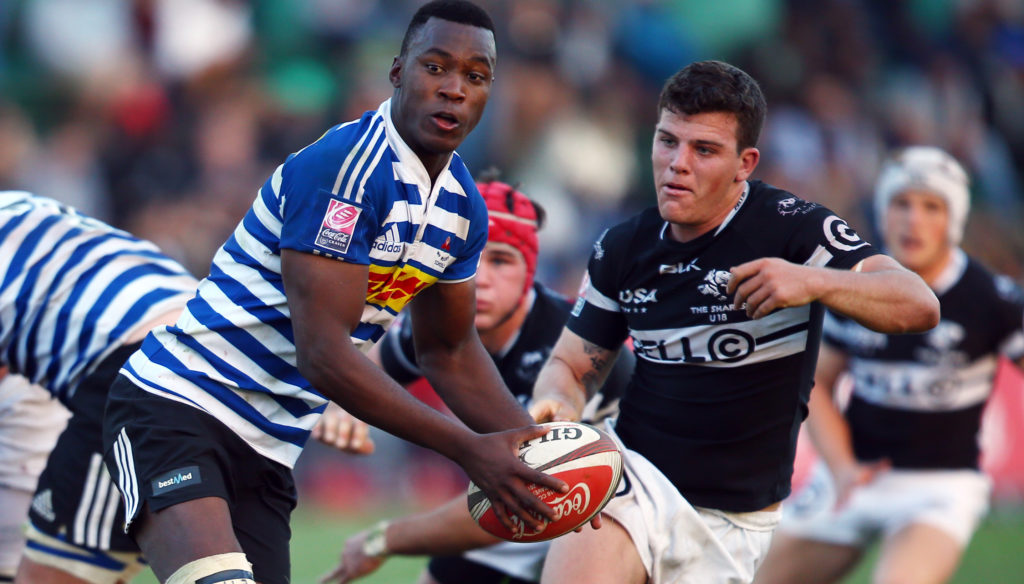Former SA Schools loose forward Khanya Ncusane has opened up about falling out of the SA rugby ‘system’ and his desire to fight his way back.
*Ed’s note: This article was written by Inam Yaphi and supplied to SARugbymag.co.za
The ‘system’ is a term that is mentioned regularly by Ncusane when talking about rugby in South Africa. It is a system rich in history and culture.
Over the last 25 years, necessary steps have been implemented to fix the unequal opportunities in the system, allowing young players like Ncusane to have a crack at professional rugby.
Ncusane’s journey was similar to many kids who played a lot of sports. The local football club, Vasco Da Gama, had spotted him early and were interested in acquiring his services for their youth team. However, in the sixth grade, his teachers urged him to go to rugby trials for the first time.
He made the Western Province U12 team in his first year.
It was clear not only to Western Province selectors, but to many top rugby schools around the country, that there was something unique about him. His introduction to the Western Province team – at 12 years old – earned him a scholarship at one of the most prestigious rugby schools in the world, Paarl Boys’ High.
Not only was this a transition between two sports that were culturally divided, but it was also a transition to an environment that would hugely influence his formative years.
Paarl Boys, known as Boishaai, is an all-boys school that has successfully produced 18 Springboks. Ncusane’s success in securing a scholarship was a sign that they had identified him as a potential first-team player down the line. But, there were a lot of challenges.
‘I went to hostel with all these Afrikaans boys, so my biggest thing was that I had to quickly learn Afrikaans. I know guys who struggled throughout high school only because they didn’t know that part of the Afrikaans culture,’ he reflects.
This was one of the challenges that came with integrating into a traditional Afrikaans school. Overcoming this would make his life easier in terms of focusing on rugby and more importantly his schoolwork.
Going to Boishaai meant that Ncusane would get the best facilities to train. Now at a renowned rugby school, there was also a feeling that he would have a better chance to remain in the system, and be able to earn attention from selectors.
‘They [selectors] identify certain players they think are the future and they invest in those players,’ he says. ‘If they see you have a future, they will check up on you at school, make sure you are training and are getting the right supplements. They look after you. Once you are part of the system and a significant name, then you are in.’
It’s understandable to look after a certain crop of players to make sure they make it through the levels. However, this makes it difficult for young players who are not at traditional rugby schools.
This is a flaw in the sport that Ncusane himself acknowledges.
‘You have to go to one of the best rugby schools [after primary school]. It won’t make sense for you to stay and get spotted if you are playing in the township.
‘You can find players in the township. But if you are not looking there you are not going to find them, so it’s going to be wasted talent. The belief you are instilling in black children is that you have to go to a good school in order to be seen. So, after Craven Week, you have to go to a good rugby school … it’s that or you out and you are done,’ he says.
When speaking about selection targets, and on whether the system can work for those who need it most, Ncusane provides a measured view.
‘The whole quota thing, man … I don’t know, it’s working for the guys that have been in the system.
‘Quota players are the guys who aren’t getting the opportunities the other guys are getting. Guys in the township, guys that lost contact, the quota should be lifting guys like me now with no contract, trying to get back in the system.’
Ncusane knows what necessary steps it took to get to this stage. He represented Western Province at all age groups, played for SA Schools and was part of one of the best Paarl Boys U19A teams of the decade, going unbeaten for a whole year.
After high school, an opportunity to leave home to play in Johannesburg for the Lions came about.
But now he is back in Cape Town where it all started, and, in a phase he calls a ‘reset’. Ncusane will not stop working and if Western Province decides to call on him, there will be a loose forward on the other side who has unfinished business.
He is hungrier and more determined than ever.





